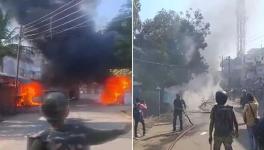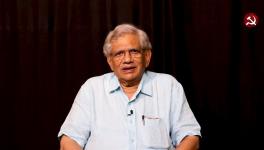TN: ‘Poor Police Accountability Leads to Human Rights Violation’
Which government handled custodial deaths in a proper manner? DMK or AIADMK? This was the topic of dispute between Tamil Nadu Chief Minister MK Stalin of the Dravida Munnetra Kazhagam (DMK) and former chief minister Edappadi K Palaniswami of the All India Anna Dravida Munnetra Kazhagam (AIADMK) in the legislative assembly on May 9.
Although cases of alleged custodial deaths have been reported, Stalin insisted that his government does not cover up anything and does not protect offenders like the AIADMK regime. Palaniswami retorted that a thorough investigation was done in the Sathankulam double custodial deaths case while his party was in power in 2020.
The grim truth is that Tamil Nadu is among the states that have a nasty track record in custodial deaths. The state is hailed for its human development index, compared to most other states in the country, but is poor in human rights.
The last available NHRC data for 2018-19 recorded 11 police custodial deaths/rapes and 89 judicial custodial deaths/rapes in Tamil Nadu. Crime data shows that from 2001 to 2018, Tamil Nadu saw over 100 custodial deaths but no convictions.
It is one year since the DMK came to power, and several custodial deaths, deaths in lock-ups, as well as other instances of brutal police torture, have been reported. This goes against the vibe that DMK took in the Sathankulam custodial deaths in June 2020.
JUSTIFYING ABUSE OF POWER
Police personnel justify being violent with criminals and rationalise physically assaulting suspects during investigations to extract confessions. It is vastly believed that law and order cannot be maintained without infringing the human rights of citizens.
“Police say we have to use force to get the truth out of the culprits. There are many scientific methods to do that these days, but even in this day and age, they uphold harassment. At times it becomes so brutal that it leads to death in custody,” said Muthuamuthanathan, a leader of All India Lawyers Union (AILU) in Madurai.
Lawyer Karl Marx, who practices at the Madras High Court, said, “Police feel that if they do not abuse power, culprits will not be scared of them. If an accused displays any form of resistance, the cops retaliate in the form of violence. They feel provoked and beat more.”
He said, “The police are not sensitised in their training to behave in a dignified manner with the public.”
However, Article 21 of the Constitution Of India declares, “No person shall be deprived of his life or personal liberty except according to procedure established by law.” Moreover, the Supreme Court has laid down guidelines relating to detention, arrests, and rights of the accused person.
Although police are not formally trained to harass and torture citizens, and it is not part of their syllabus, police abuse is widespread, experts say.
“They start by obeying the orders of their higher authorities; if they are told to beat up the suspect, they do it. Over time they pick up the cycle of abuse,” said film director Thamizh. He recently directed Taanakkaran, a film based on real-life incidents related to police training, and he was formerly in the Tamil Nadu police department.
“There have been no major changes in the police department since colonial times. The IPCs have changed, but in practice, the mentality of the police has seen little progress,” he added.
He also said, “the police are also treated poorly by their higher authorities, they also work without time limits, and it is partly a reason for their frustration that they vent out on the public”.
The DMK election manifesto promised one-day holiday for all police personnel, a grievance redressal mechanism for police personnel at district and state levels, and others. They have still not been implemented.
POLICE NOT MADE ACCOUNTABLE
Tabling the policy note of the Home, Prohibition and Excise Department in the state assembly, Stalin said on May 9 that a comprehensive training would be designed to inculcate friendly behaviour in the police towards the common public.
However, the question remains whether that is sufficient to end police atrocity. Although many argue that police should be trained to be sensitive towards the public, Henry Tiphagne told NewsClick that police should be made accountable for abuse of power.
“The problem is if the police can always get away with impunity, they will do as their higher authorities direct them. They should be made accountable for custodial torture, that is the only way forward,” said Henry Tiphagne. Tiphagne is the founder and executive director of Madurai-based human rights organisation People’s Watch.
“The police are fearless; the custodial death of Vignesh and the efforts to cover it up took place when the assembly was in session. They are confident that a rank of officers would be protected whatever happens,” he said. Tiphagne is assisting Vignesh’s aggrieved family through Joint Action Committee against Custodial Torture, fighting for Vignesh’s custodial justice.
He also said “the postmortem report was available to the police when the police wrote the report on Vignesh’s death, yet they wrote that he died due to poor health and health complications”.
Doctors who performed the autopsy reported 13 injuries on Vignesh’s body, from head to toe, including a fracture on the right leg, which points to likely police torture.
“The police gang up with other institutions, including the judiciary. That is what is disappointing. The judicial magistrate could have collected the postmortem report and given it to the family. But that did not happen,” said Tiphagne.
“Institutions duly constituted to prevent such atrocities and to ensure justice for those compromised are being silent. No suo moto action was taken by the high court. Why?” he asked. “This makes the police fearless,” he added.
In the custodial death case of farmer Murugesan in June 2021, the Madras high court refrained from taking suo moto cognisance, expressing dismay over people not adhering to lockdown restrictions and picking quarrels with police.
“No accountability systems are put to practice. Why does the government not say zero tolerance to torture in Tamil Nadu? Why does it not say mandatory CCTV in every police station? Why does the police target the socially and economically poor?” he further asked.
POOR & DOWNTRODDEN TARGETED
In general, the socio-cultural background of those who become victims of the police are from deprived communities. Director Thamizh said, “The police do not fear harassing common people. if they beat up a commoner, nobody would question them, so they do as they wish.”
“The police inspector gave rupees one lakh to Vignesh’s family. Economic poverty and social exclusion become the deciding factor on who the police targets,” said Tiphagne.
“We had to move Vignesh’s family out of Chennai to ensure they are not targeted by the police. It was difficult for them to travel to Chennai every day, but we had to do it,” Tiphagne’s organisation People’s Watch is giving legal support to the family.
The DMK party claims to be the forerunner of social justice in the country, but such grave violations of human rights are occurring in its tenure, and mere promises of thorough investigations after instances of custodial deaths have not sufficed.
Get the latest reports & analysis with people's perspective on Protests, movements & deep analytical videos, discussions of the current affairs in your Telegram app. Subscribe to NewsClick's Telegram channel & get Real-Time updates on stories, as they get published on our website.
























